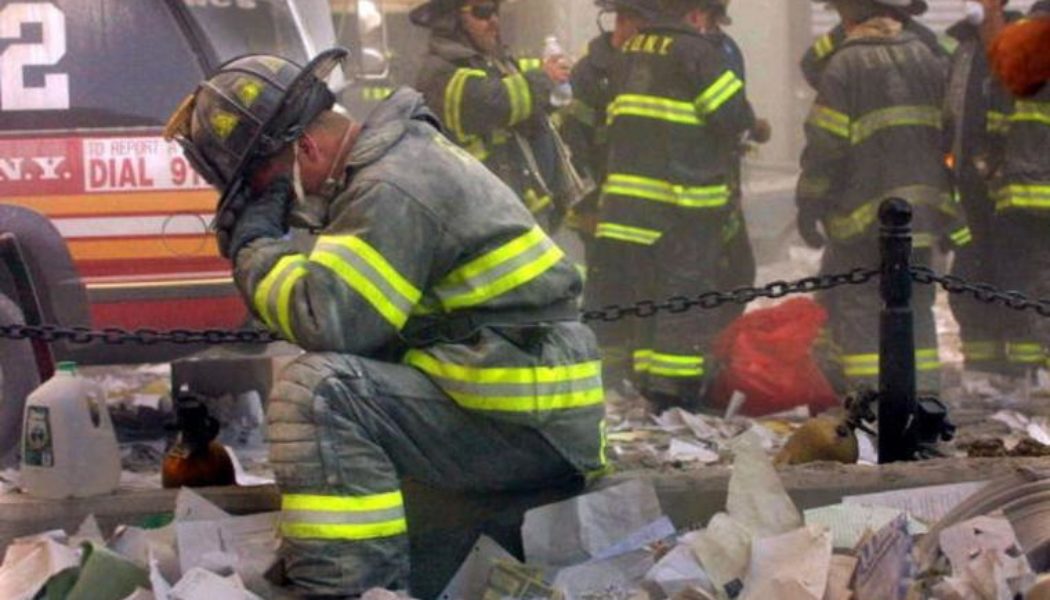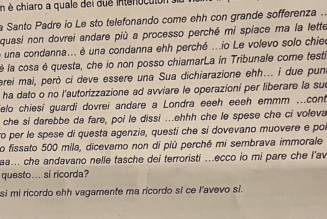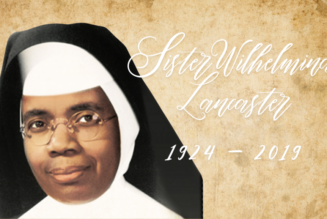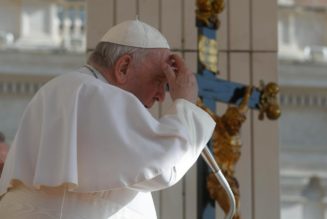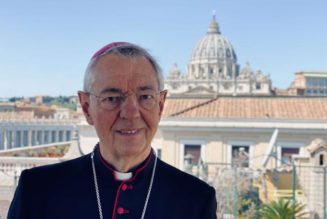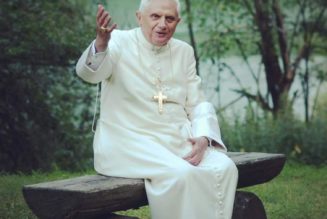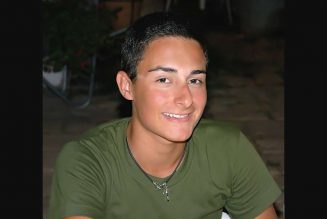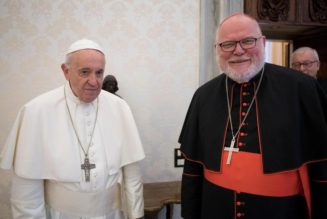
NEW YORK CITY — On Sept. 11, 2001, Father Conrad Osterhout of the Franciscan Friars of the Renewal was living in St. Joseph Friary in Harlem on 142nd Street as head of the house.
“The first alarm for us were the people in the street calling out to us,” he told the Register of that tragic day. The friars could see nothing directly, but soon they got confirmation from radio reports. And then a firefighter “rode up to our house on a bicycle, asked for a scapular, prayer and a blessing” as he raced to lend a hand to brother firefighters far downtown.
Later that day, when Father Osterhout arrived at Ground Zero with other friars, a gate barring entry to the immediate site had already been put up. The acrid air was filled with smoke and dust, with the friars unmasked.
“Standing under a lamppost, four or five friars were praying,” he vividly remembered. “A fireman came up to some of the brothers and told them, ‘When we go in there, we feel like we’re on the edge of hell, and when we come out and see you praying, we feel we’re gaining the victory.’ There was on our firemen clearly a lot of distress, some looking for fellow workers, partners, assuming in some cases those firemen would never be found. It was very distressing.”
The next day the friars could not get as close as the previous night.
The weight of that fateful day remains two decades later.
The horrific nature of 9/11 shocked the citizens of the United States “because we’ve never experienced something so close, and there’s a loss of words because of the shock of that.” He finds consolation in the memorial New York City erected that represents all life lost that day, including the unborn children.
He added that “we’ve made some progress in our mourning in 20 years. But we still need to pay attention to it … and know that we’re in God’s hands.”
“Without a doubt, every year since 9/11, pretty much everyone connected to the New York Fire Department at the time is affected,” FDNY Deputy Assistant Chief Michael Meyers, the chief of safety, told the Register. “You know when that clock turns to September you’re going to feel bad all over again. It takes a couple of weeks after 9/11 to get past all the pain.” He said it is exceptionally important for his fellow firefighters and other first responders to remember those who gave their lives, to keep their names alive, to remember the loss of friends, and to thank God for one’s life.
The numbers at the FDNY counseling service unit — a model program for the whole country since 9/11 for peer as well as professional counseling — definitely pick up this time of year.
Yet not all memories are tragic. Chief Meyers emphasized, “What was incredible on that day is the worst in humanity brought out the very best in humanity.”
He recounted that on 9/11 he arrived on site 20 minutes after the second tower collapse and spent the next 18 hours there before taking a short rest break. “People were cheering for you, handing you bottles of water. The people of the city rose up and did that day after day — for years. People became huge fans of the FDNY.” He added, great became “the spirit of generosity to help us in that time. It brought out the very best of people, and we needed every ounce of it. … There are a lot more incredible human beings in the world than bad ones. That’s why we do that, putting our lives on the line every day.”
Meyers said, “That’s why that steel cross was the last thing that came down at the site. It meant to us and the people that God was with them through all of this.”
Despite the years, people have not forgotten. Year after year, especially on Sept. 11, he said, “People over time come by and pay their respects. Some have tears in their eyes, shaking your hand and thanking you. They come from all over, every country, every place, creed and color. It’s awesome stuff.”
For this anniversary, Chief Meyers recommends ways to honor those lost in 9/11 — the nearly 3,000 people killed in the attacks.
While firehouses will hold ceremonies that morning to remember and honor those who sacrificed so much that day, and many will attend the annual 9/11 Mass at St. Patrick’s Cathedral, Meyers encourages people to do something in honor of a person they knew and loved: “Do something nice for someone. How many heroic stories of people in the building we will never get to hear as they helped other employees in the building. So pay something forward. Do something in the kindness of your heart, and do it in their name.”
Churchgoers Remember
Within a city block from the World Trade Center stands St. Peter’s Church (recently combined with Our Lady of the Rosary Church and renamed St. Peter-Our Lady of the Rosary parish), the first Catholic parish in New York.
Parishioners were caught up in the events of 20 years ago. And the memories linger.
“I saw the whole thing. It happened right in front of me,” said Dorothy (who preferred not to use her last name). “It is very painful to talk about. It triggers a lot of emotions. My husband, Anthony, went through all this, too, and we were very traumatized.”
But that horrible day gave them new perspective. She told the Register, “We began to treasure every moment together more than ever. And I taught him how to pray that day. He was not Catholic at the time. We prayed a lot since then.” And they continued to pray together until Anthony died four years ago.
Ever since, Dorothy has gone to daily Mass at St. Peter’s. She has seen other changes over time in some of her neighbors who are not Catholics, due to 9/11.
“I think they are much nicer people,” she said. She has also noticed people being more thoughtful to firemen and policemen.
Native New Yorker Mary Lucio also attends St. Peter’s and has lived in the neighborhood 24 years. What began as a beautiful, sunny Tuesday 20 years ago still stirs painful memories. “I try not to dwell on it because the experience was very bad, and you don’t want to dwell on that,” she told the Register.
Lucio lives one block from the World Trade Center. “We couldn’t go to church here, as all the area was blocked off. The church was shut down. No Mass” — because, she said, emergency personnel were using the church as a temporary resting place for the dead.
In recent years, Lucio has seen neighborhood revitalization, with the location becoming more of a residential area.
Despite the painful memories, she recognized an important gain: “I got closer to God. I want to be ready, so I got closer to the church. I had a good foundation, and sometimes we take the church for granted, and we think it will always be there. But we almost lost the church and everything around it.”
At the Pentagon
The terrorists who planned the 9/11 attacks also targeted Washington, D.C. At the Pentagon, one simple, unmovable “No” kept 35 chaplains and their staff from being killed on Sept. 11, 2001. Msgr. Philip Hill, who served as an Army chaplain in Iraq, Kuwait and Afghanistan, was then the chief of staff for the U.S. Army’s Chief of Chaplains Office at the Pentagon. Earlier in the year, Thomas White, the secretary of the Army, had moved the chaplains’ offices to the other side of the Pentagon. The chaplains wanted it back where it was.
“Tom always said ‘Yes’ to the chaplains, but ‘No,’ he wouldn’t let us come back,” Msgr. Hill recalled. “If we had gone to our old offices, we all would have been dead today.” The plane hit where the Chief of Chaplains Office would have been. And all military chaplaincy leadership would have been killed.
Msgr. Hill was saved twice that day. He was scheduled to have an early morning meeting with Lt. Gen. Tim Maude, head personnel officer of the Army.
But the meeting was changed at the last minute. Maude was one of 125 people, and the highest-ranking U.S. military officer, killed in the Pentagon that day.
“When we look back on the whole incident, I try to look at the good side of things,” the retired chaplain said 20 years later.
He saw how the day changed many soldiers and sailors “into more realistic people.”
Although once a threat is over people have a tendency to go back to their old ways, he believed that God had a little more to do with their lives when that happened, as did the subsequent combat tours he accompanied. “The experience of those combat tours helped them to be more compassionate and deal with their own soldiers, sailors and marines,” said Msgr. Hill. He also watched 18- to 19-year-olds become much more mature, “and in many cases, much more spiritual. In those cases, it is a choice of whether you want to go with God or with the world” when facing life-or-death situations. He has seen many retain a faith-focused outlook and hopes that “the people in service will always keep their faith paramount. Without that, they have nothing to back them up in the battlefield.”
Aiding Those in Need
Msgr. Kevin Sullivan has been the executive director of Catholic Charities of the Archdiocese of New York since 2001. His first major job was to coordinate the human services response to 9/11 families and victims as chairman of the 9/11 United Services Group.
Immediately after the attack, “the Human Services Community came together to try to figure out how we could provide the help needed to those impacted by 9/11,” he said. “We did provide some burial assistance and assistance to those 12,000 to 15,000 immediate relatives who needed a variety of help. The first circle were the family members of those killed that tragic morning.”
First, there were counseling services. Also, they walked with those who lost their breadwinner through the heart-wrenching steps of obtaining the needed services.
Explained Msgr. Sullivan: “One of the more important things we did was to provide case management to those people,” helping them through paperwork, red tape and bureaucracy. Msgr. Sullivan explained that Catholic Charities was critically involved with those negatively impacted, not only the family members of those who died, but so many who lived and worked in that neighborhood. “Tens of thousands lost their jobs — those who were not there that morning but had overnight jobs. Overnight, they had no job. It was very important for Catholic Charities to pay attention to these people. The world rightly focused on those who lost their lives, but it’s easy to forget that tens of thousands of others lost their livelihoods and jobs because those towers came down that morning.”
“We were helping people to recover from 9/11 for years,” he said. “People don’t get over that shock or impact in six months. It takes time. In Catholic Charities, we were there when the cameras went away. We stayed with people for the long term, to help them recover and rebuild their lives.”
Msgr. Sullivan believes that, now, “the entire 20th anniversary of 9/11 will be seen through the prism of what’s going on in Afghanistan.”
“The tragedy and the crisis of 9/11 does remind us of the need of solidarity and coming together. Even though every crisis and tragedy is different, they have in common to meet the needs of others who have been impacted more than us. Therefore, it calls us to an even greater generosity for the sake of others,” adding that Someone else said this before him — Jesus.
Lessons in generosity and God’s providence, two decades on, have not made the memories fade for Lucio.
“I still tear up,” she said.
“It’s still heartbreaking because I lived through it. Even though it’s 20 years, it’s still painful because I was part of 9/11. I don’t want to remember it. But it’s not something that America should forget.”
Join Our Telegram Group : Salvation & Prosperity
